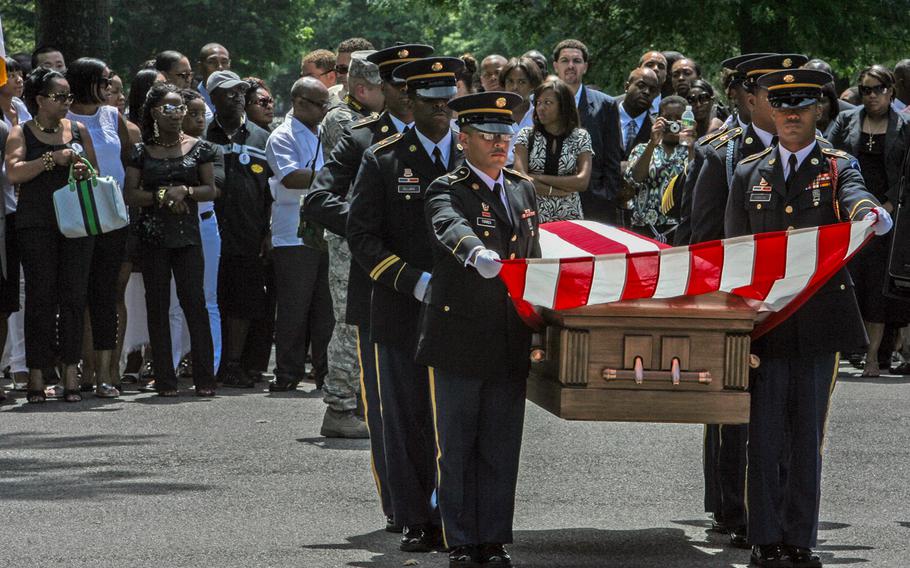
In this July 10, 2008, file photo, friends and family watch a military honor guard carry the casket of Sgt. 1st Class Joseph A. McKay, during a funeral service at Long Island National cemetery in Farmingdale, N.Y. McKay’s death was included in the indictment of former Taliban commander Haji Najibullah. (Mary Altaffer/AP)
NEW YORK — A former Taliban commander pleaded guilty Friday to providing weapons and other support for attacks that killed American soldiers and for key roles in the 2008 gunpoint kidnapping of a reporter for The New York Times and another journalist.
Speaking through an interpreter, Haji Najibullah entered the plea in Manhattan federal court to providing material support for acts of terrorism and conspiring to take hostages.
The bearded Najibullah, wearing a black skull cap over his shaved head, told Judge Katherine Polk Failla that he provided material support including weapons and himself to the Taliban from 2007 to 2009, knowing that his support “would be used to attack and kill United States soldiers occupying Afghanistan.”
“As a result of material support I provided to the Taliban, U.S. soldiers were killed,” Najibullah said.
He said his material support also included his role as a Taliban commander in Afghanistan’s Wardak Province, “where the fighters under me were prepared to, and sometimes did, conduct attacks against U.S. soldiers and their allies using suicide bombers, automatic weapons, improvised explosive devices and rocket propelled grenades.”
Najibullah, 49, said he also participated in the hostage taking of David Rohde “and his companions” so demands could be made for ransom and for the release of Taliban prisoners held by the U.S. government.
“I created proof-of-life videos of David Rohde and his companions in which they were forced to convey the Taliban’s demands,” he said.
The former Times reporter and Afghan journalist Tahir Ludin were abducted when they were on their way to interview a Taliban leader.
Both men made a dramatic escape from a Taliban-controlled compound in Pakistan’s tribal areas more than seven months after their Nov. 10, 2008, kidnapping. Their driver, Asadullah Mangal, was a third kidnapping victim. He escaped a few weeks after Ludin and Rohde.
Rohde, a Pulitzer Prize winner who now works as senior executive editor for national security at NBC News, attended the plea proceeding.
“I am pleased that he admitted his guilt today and grateful to all the U.S. officials who brought him to justice,” he said in an email to The Associated Press after his sentencing. “Most of all, my heart goes out to the families of the three U.S. soldiers and the Afghan translator who were killed.”
After the plea, Najibullah was led from the courtroom in shackles and handcuffs by U.S. marshals to face an Oct. 23 sentencing. Federal sentencing guidelines, as acknowledged by a plea agreement signed by Najibullah and prosecutors, recommend a life prison sentence.
New York Times spokesperson Danielle Rhoades Ha expressed gratitude to U.S. authorities for pursing Najibullah, and she noted the dangers journalists face worldwide.
“More than 120 journalists were killed in 2024, the most on record,” she said. “Journalists go to dangerous places to uncover the facts that citizens need. Governments can and should protect journalists by investigating all attacks against reporters and publicly condemning threats.”